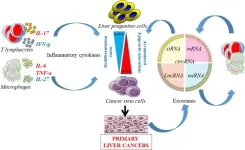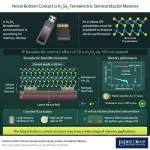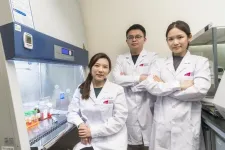(Press-News.org) The American Society for Biochemistry and Molecular Biology announced today the winners of its annual awards. Colleagues and other leaders in the field nominated the winners for making significant contributions to biochemistry and molecular biology and the training of emerging scientists.
The recipients will give talks about their work at the society’s 2024 annual meeting, Discover BMB, slated for March 23–26 in San Antonio.
In addition to cash prizes ranging from $2,000 to $35,000, each ASBMB award consists of a plaque and transportation expenses to the ASBMB annual meeting.
Learn more about the ASBMB awards.
Avanti Award in Lipids
Recognizes outstanding research contributions in the area of lipids.
Tamás Balla is a senior investigator at the Eunice Kennedy Shriver National Institute of Child Health and Human Development. He leads the Section on Molecular Signal Transduction, which studies the spatial and temporal organization of cellular membrane lipid composition that serves as platforms for intracellular signals that mediate the actions of cell surface receptors.
Balla earned his medical degree from Semmelweis University School of Medicine in Hungary in 1979 and his Ph.D. from the Hungarian National Academy of Science in 1987. He completed postdoctoral training at the NICHD and was on the faculty of Semmelweis before joining the NIH.
He is an external member of the Hungarian Academy of Sciences and was on the 2022 Annual Meeting Program Planning Committee.
Balla has been an ASBMB member since 2001.
Bert & Natalie Vallee Award in Biomedical Science
Awarded to an established scientist for outstanding accomplishments in basic biomedical research.
Hao Wu is a professor at Harvard Medical School. Wu’s lab uses cryo-electron microscopy and other biophysical methods to understand molecular complexes involved in innate immunity, including signalosomes and pore-forming complexes like gasdermin D.
She is a fellow of the Biophysical Society and the American Association for the Advancement of Science, a Pew scholar, and a 2015 recipient of the NIH Pioneer Award. Wu studied medicine at Peking Union Medical College, earned her Ph.D. at Purdue University and was a postdoc at Columbia University. She started her faculty career at Weill Cornell Medical College before moving to Harvard Medical School.
Wu has been a member of the ASBMB since 2018.
Earl and Thressa Stadtman Distinguished Scientist Award
Awarded to a distinguished scientist for their outstanding achievement in basic research in the fields encompassed by the ASBMB.
Bruce Stillman is president and chief executive officer of Cold Spring Harbor Laboratory. Stillman’s lab studies the process by which DNA is copied within cells before they divide. Working with yeast and human cells, his team has identified many cellular proteins that function at the DNA replication fork during the S phase, the portion of the cell-division cycle when DNA synthesis occurs. Among these are proteins that facilitate the assembly of chromatin. Stillman and colleagues also determined the mechanism and control of the initiation of DNA replication in eukaryotic cells. Stillman earned a Ph.D. from the John Curtin School of Medical Research at the Australian National University and then moved to Cold Spring Harbor Laboratory as a postdoctoral fellow in 1979. He was appointed director in 1994 and president in 2003. He has been elected to the Royal Society, the U.S. National Academy of Sciences, the American Academy of Arts and Sciences and the Australian Academy of Science. He is a fellow of the American Association for Cancer Research. Stillman has been a member of the ASBMB since 1991.
Herbert Tabor Research Award
Given for outstanding, innovative accomplishments in biological chemistry and molecular biology and contributions to the community of scientists.
Margaret Phillips is chair of the biochemistry department at the University of Texas Southwestern Medical Center, where her research focuses on metabolism in protozoan parasites. Her lab studies essential enzymes controlling pyrimidine biosynthesis in the parasite that causes malaria and polyamine synthesis in the trypanosome that causes sleeping sickness. Her lab has used structural-guided drug design to optimize and develop pyrimidine synthesis inhibitors with the potential to become antimalarial drugs.
Phillips earned her Ph.D. from the University of California, San Francisco, where she was also a postdoctoral fellow.
She served on the Journal of Biological Chemistry editorial board for 10 years and chaired the selection committee for the ASBMB’s Alice and C.C. Wang Award in Molecular Parasitology for 10 years. Phillips, a member of the National Academy of Sciences, was named an ASBMB fellow in 2022.
Phillips has been a member of the society since 1993.
ASBMB Mildred Cohn Young Investigator Award
Recognizes outstanding research contributions to biochemistry and molecular biology.
Nozomi Ando is an associate professor at Cornell University’s chemistry and chemical biology department. Her lab works on new structural biology methods, such as diffuse scattering analysis of X-ray diffraction images of protein crystals to obtain information about movement within proteins. The lab has found that there are two types of correlated motion in protein crystals: those within a single protein, and those that connect two or more individual protein units. The finding has implications for our understanding of how allostery works.
Ando, who presented her work at the ASBMB annual meeting in Philadelphia in 2022, also works to advance structural biology education and diversity in STEM.
Ando earned her Ph.D. at Cornell University and completed postdoctoral training at the Massachusetts Institute of Technology. She won the American Crystallographic Association’s Margaret C. Etter Early Career Award in 2020 and the Protein Society’s Protein Science Young Investigator Award in 2022.
Ando has been a member of the ASBMB since 2021.
Ruth Kirschstein Diversity in Science Award
Honors an outstanding scientist who has shown a sustained commitment to breaking down local and/or systemic barriers against scientists and students from historically marginalized or excluded groups.
Shana Stoddard is an associate professor of chemistry, the founding director of the STEM Cohort Mentoring Program, and in 2021 was the inaugural director of student mentoring at Rhodes College. Stoddard’s lab, which hosts about 10 undergraduates each year, does protein structure modeling and analysis, structural biology and drug design. Her team is developing novel therapies for autoimmune disorders such as primary membranous nephritis, an incurable, kidney-specific condition that can lead to end-stage renal disease. Additionally, she develops bio-tools to study protein–structure function relationships.
Stoddard holds a Ph.D. in chemistry from the University of Mississippi as well as a master’s in education from Freed–Hardeman University. She did a postdoctoral stint at St. Jude Children’s Research Hospital and joined Rhodes College in 2015 as a William Randolph Hearst Teaching fellow before taking an assistant professor position two years later.
Stoddard said the mentoring she received as an undergrad at Prairie View A&M University served as a launching point for her to realize that she had to have a career combining research, teaching and mentoring. At Rhodes, Stoddard founded and leads the STEM Cohort Mentoring Program, which boasts a 96% graduation rate; has led multiple initiatives dedicated to making the STEM training experience and workforce more diverse and inclusive; and organizes events for chemists of color. She also directs the ASBMB Student Chapter there. Stoddard said she believes that each opportunity she has to serve as a mentor is an opportunity to draw out a student's potential. It is her goal to not only “change the fabric of STEM” through her research endeavors but also by “taking the doors off the hinges, creating gateways" so that system barriers don't prevent access for anyone to pursue a STEM career.
Stoddard has been a member of the ASBMB since 2016.
Walter A. Shaw Young Investigator Award in Lipid Research
Recognizes outstanding research contributions in the area of lipids by a young investigator.
Judith Simcox is an assistant professor of biochemistry at the University of Wisconsin–Madison. Her lab studies plasma lipids that regulate metabolic disease and explores how these lipids function using lipidomics, genetics and cellular and molecular biology techniques.
Simcox earned her Ph.D. and completed a postdoctoral fellowship at the University of Utah, where she took several leadership and mentoring positions to promote diversity in STEM. She is credited, for example, with helping build the university’s internship program for emerging Native American scientists.
She joined the faculty at Madison in 2019 and has continued outreach and service that has earned her national recognition. She was named a junior associate editor for the Journal of Lipid Research in 2021 and is a recipient of the HHMI Freeman Hrabowski Scholars Award.
Simcox has been a member of the ASBMB since 2020.
ASBMB William C. Rose Award for Exemplary Contributions to Education
Recognizes an individual who demonstrates an exceptional contribution to the teaching of biochemistry and molecular biology.
Peter J. Kennelly is a professor at the Virginia Polytechnic Institute and State University, where he also serves as interim head of the biochemistry department.
Kennelly earned his Ph.D. from Purdue University in 1985 and completed postdoctoral research at the University of Washington School of Medicine with support from the Howard Hughes Medical Institute.
He started his faculty career in 1989 at Virginia Tech, where his research program focused on protein kinases and signaling in Archaea, about which he published seminal studies. He later transitioned to academic leadership, served as head of the biochemistry department for a decade, until 2016, and again took up the mantle on an interim basis in 2022. His first term as head also witnessed a deepening commitment to and interest in teaching and learning fueled to a large degree by interactions with ASBMB's growing community of scientist-educators.
He is a past chair of the ASBMB Education and Professional Development Committee and Membership Committee and has been pivotal to the success of the ASBMB accreditation program and certification exam. He served on the editorial board of the Journal of Biological Chemistry.
Kennelly has been a member of the ASBMB since 1986.
ASBMB Sustained Leadership Award
Recognizes individuals with a strong commitment to advancing the careers of women in biochemistry and molecular biology along with demonstrated excellence in research and/or service.
Adele J. Wolfson is a professor emerita of chemistry and natural and physical sciences at Wellesley College. Her lab studied proteases and peptidases with a focus on the enzyme thimet oligopeptidase, which terminates the signal of bioactive peptides. Her recent educational research focuses on concept inventories in biochemistry and on understanding how students connect learning in science and nonscience courses.
Wolfson earned her Ph.D. at Columbia University and did postdoctoral work at the University of Paris. During her many years at Wellesley, she advocated for women and other historically marginalized groups to diversify the STEM workforce. She held numerous leadership positions — she was both a dean and director several times over — and implemented programs for mentoring and other means of ensuring student success.
Wolfson served as co-chair of what was formerly the ASBMB Committee on Equal Opportunities for Women. She also led the ASBMB Programmatic Accreditation Committee, on which she still serves, and the Education and Professional Development Committee. She also organized the society’s first women’s mentoring session at the annual meeting.
She is a fellow of the American Association for the Advancement of Science. In 2021, she was named an ASBMB fellow.
Wolfson has been a member of the society since 1986.
Alice and C.C. Wang Award in Molecular Parasitology
Recognizes established investigators who are making seminal contributions to the field of molecular parasitology.
David S. Roos is a professor of biology at the University of Pennsylvania. His laboratory studies the biochemistry, cell biology, molecular genetics, genomics and evolutionary biology of protozoan parasites and host–pathogen interactions, with special interest in Toxoplasma, a prominent opportunistic infection associated with immunodeficient states, and Plasmodium, which causes malaria. His group has also pioneered the development of integrated genomics database resources, including VEuPathDB.org (the Eukaryotic Pathogen, Vector and Host Informatics Resource), the ortholog database OrthoMCL.org and ClinEpiDB.org epidemiology resources, making large-scale datasets accessible to tens of thousands of investigators worldwide.
Roos earned his Ph.D. at The Rockefeller University in 1984 and completed postdoctoral training at Stanford University. His work has been recognized by a Presidential Young Investigator Award from the National Science Foundation, the Burroughs Wellcome Scholar Award, the Ellison Medical Foundation Senior Scholar Award in Global Infectious Diseases and a National Institute of Health MERIT award. His group’s database resources have been recognized as a Global Core Biodata Resource, an Elixir affiliate, and by a Dataworks! prize from the Federation of American Societies for Experimental Biology.
About the American Society for Biochemistry and Molecular Biology (ASBMB): The ASBMB is a nonprofit scientific and educational organization with more than 12,000 members worldwide. Founded in 1906 to advance the science of biochemistry and molecular biology, the society publishes three peer-reviewed journals, advocates for funding of basic research and education, supports science education at all levels, and promotes the diversity of individuals entering the scientific workforce. For more information about the ASBMB, visit www.asbmb.org.
END
ASBMB names 2024 award winners
Don’t miss their lectures at #DiscoverBMB in March in San Antonio
2023-08-16
ELSE PRESS RELEASES FROM THIS DATE:
New and updated resources published to help guide oncology care in the Middle East and North Africa (MENA)
2023-08-16
PLYMOUTH MEETING, PA [August 16, 2023] — The National Comprehensive Cancer Network® (NCCN®)—an alliance of leading cancer centers—today announced that a library of resources for improving cancer care in the Middle East and North Africa (MENA) has been updated and expanded in collaboration with regional experts. The United States-based non-profit has worked with the King Abdulaziz Medical City in Riyadh, Saudi Arabia, since 2015 to standardize cancer treatment based on the latest evidence and expert-consensus, as part of the MENA-NCCN Regional Coordinating Center. Their efforts have led to the ...
Gray wolf recovery is a success—is that a problem?
2023-08-16
Over the past 30 years, efforts to recover gray wolf populations in the United States have been broadly successful, with many regions now sporting robust populations of the charismatic carnivore. Writing in BioScience, wolf experts David E. Ausband and L. David Mech describe the conservation landscape and also the obstacles that wolves face as their populations expand into their historical ranges.
"Remarkable wolf conservation success yields remarkable challenges," ...
Common wristbands ‘hotbed’ for harmful bacteria including E. coli, staphylococcus
2023-08-16
The COVID-19 pandemic took disinfecting to new heights. Now, a new study examining a commonly used item might convince you not to let your guard down just yet.
Researchers from Florida Atlantic University’s Charles E. Schmidt College of Science tested wristbands of various textures to determine their risk for harboring potentially harmful pathogenic bacteria. Despite being worn daily, routine cleaning of wristbands is generally overlooked or simply ignored.
For the study, researchers tested plastic, rubber, cloth, leather ...
What is the next step in preventative therapies for treating liver cancer?
2023-08-16
Primary liver cancers ranked as the sixth most commonly diagnosed cancers and the third leading cause of cancer-related death in 2020. Among all primary liver cancers, HCC is the most common cancer, accounting for more than 80% of cases with a 5-year survival rate of less than 10% in Western countries. Despite significant progress in diagnosis and treatments, HCC, often diagnosed at late stages, remains a life-threatening disease with an increasing incidence. Therefore, a better understanding of the underlying mechanisms triggering the early steps of tumorigenesis represents a great interest to predict and propose more effective therapeutic ...
Layered and traditional semiconductors heterogenous integration open door for post Moore era
2023-08-16
Scientists in NEXT Lab, Tsinghua University have revealed the fabrication and engineering techniques of TMDs and provided a comparative view between TMDs and traditional semiconductors, demonstrating the benefit of combining TMDs with traditional semiconductors.
The research, published in IJEM, shows how to fabricate layered semiconductors modulated with various methods, including phase engineering, defect engineering, doping, and alloying. Then the authors discuss various possibilities to combine layered semiconductors with traditional semiconductors.
Transition metal dichalcogenides (TMDs) with suitable ...
Novel lateral data storage: Two-dimensional ferroelectric semiconductor memory with a bottom contact 100 nm channel using in-plane polarization
2023-08-16
Traditional memory technologies face limitations in terms of speed, scalability, and power consumption, making them unsuitable for future data-intensive applications. Ferroelectric memory has garnered immense interest in recent years due to its potential for non-volatile storage, enabling data retention even when the power is turned off. The development of two-dimensional (2D) van der Waals material α-In2Se3 has also opened new opportunities for advancing memory technologies.
Interestingly, ferroelectric memory takes a giant step forward by incorporating the remarkable properties ...
Professor Ibrahim Abubakar awarded 2023 Roux Prize
2023-08-16
SEATTLE, Wash. August 16, 2023–Distinguished global health leader Ibrahim Abubakar is the recipient of the 2023 Roux Prize for his dedication to improve health outcomes over the last three decades.
Now in its 10th year, the Roux Prize has been recognizing individuals all over the globe who have leveraged evidence-based health data to improve population health. The Roux Prize is awarded by the Institute for Health Metrics and Evaluation (IHME) at the University of Washington’s School of Medicine.
“Prof. Abubakar has been steadfast in his contributions to global health. His expertise and advocacy have directly affected policy implementation and ...
Genetically modified neural stem cells developed by CityU and HKUMed researchers show promising therapeutic potential for spinal cord injury
2023-08-16
A research team co-led by City University of Hong Kong (CityU) and The University of Hong Kong (HKU) has recently made a significant advancement in spinal cord injury treatment by using genetically modified human neural stem cells (hNSCs). They found that specifically modulating a gene expression to a certain level in hNSCs can effectively promote the reconstruction of damaged neural circuits and restore locomotor functions, offering great potential for new therapeutic opportunities for patients with spinal cord injury.
Traumatic spinal cord injury ...
Coronavirus: Researchers develop new rapid and reliable detection method
2023-08-16
Commercially available mass spectrometers can reliably detect the SARS-CoV-2 coronavirus. In the journal "Clinical proteomics" researchers from the Martin Luther University Halle-Wittenberg (MLU) present a new method which employs equipment that is already being used in hospitals and laboratories to detect bacterial and fungal infections. It takes just two hours from swab to result. According to the team, the approach can also be easily adapted to detect other pathogens and could thus help in future ...
Spectrum of apps shrinks after ban on personalized ads
2023-08-16
A ban on using apps to collect data in order to personalize advertising would significantly reduce the spectrum of available apps and the number of updates, according to a study by the Technical University of Munich (TUM) based on the ban concerning Android apps for children. The findings can assist companies in defining their business models and policymakers when regulating targeted advertising.
Most smartphone apps are free. The providers finance them with advertising, often with what is referred to as targeted advertising: The apps evaluate data such as usage behavior and the user's location and even photos and messages ...
LAST 30 PRESS RELEASES:
COVID-19 vaccination during pregnancy may help prevent preeclampsia
Menopausal hormone therapy not linked to increased risk of death
Chronic shortage of family doctors in England, reveals BMJ analysis
Booster jabs reduce the risks of COVID-19 deaths, study finds
Screening increases survival rate for stage IV breast cancer by 60%
ACC announces inaugural fellow for the Thad and Gerry Waites Rural Cardiovascular Research Fellowship
University of Oklahoma researchers develop durable hybrid materials for faster radiation detection
Medicaid disenrollment spikes at age 19, study finds
Turning agricultural waste into advanced materials: Review highlights how torrefaction could power a sustainable carbon future
New study warns emerging pollutants in livestock and aquaculture waste may threaten ecosystems and public health
Integrated rice–aquatic farming systems may hold the key to smarter nitrogen use and lower agricultural emissions
Hope for global banana farming in genetic discovery
Mirror image pheromones help beetles swipe right
Prenatal lead exposure related to worse cognitive function in adults
Research alert: Understanding substance use across the full spectrum of sexual identity
Pekingese, Shih Tzu and Staffordshire Bull Terrier among twelve dog breeds at risk of serious breathing condition
Selected dog breeds with most breathing trouble identified in new study
Interplay of class and gender may influence social judgments differently between cultures
Pollen counts can be predicted by machine learning models using meteorological data with more than 80% accuracy even a week ahead, for both grass and birch tree pollen, which could be key in effective
Rewriting our understanding of early hominin dispersal to Eurasia
Rising simultaneous wildfire risk compromises international firefighting efforts
Honey bee "dance floors" can be accurately located with a new method, mapping where in the hive forager bees perform waggle dances to signal the location of pollen and nectar for their nestmates
Exercise and nutritional drinks can reduce the need for care in dementia
Michelson Medical Research Foundation awards $750,000 to rising immunology leaders
SfN announces Early Career Policy Ambassadors Class of 2026
Spiritual practices strongly associated with reduced risk for hazardous alcohol and drug use
Novel vaccine protects against C. diff disease and recurrence
An “electrical” circadian clock balances growth between shoots and roots
Largest study of rare skin cancer in Mexican patients shows its more complex than previously thought
Colonists dredged away Sydney’s natural oyster reefs. Now science knows how best to restore them.
[Press-News.org] ASBMB names 2024 award winnersDon’t miss their lectures at #DiscoverBMB in March in San Antonio



